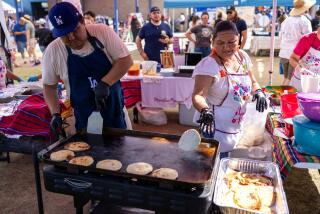Salvador Rebels Renew Attack, Hit Rich Areas
- Share via
SAN SALVADOR — Leftist guerrillas took over mansions in San Salvador’s elegant western suburbs Wednesday, temporarily trapping scores of Americans, foreign diplomats and rich Salvadorans in a sudden resurgence of urban warfare.
The army surrounded the area with light tanks and ground troops but was held at bay by rebel sniper fire until after dark.
American officials closed the U.S. Embassy and encouraged the 270 dependents of embassy personnel to leave El Salvador on charter flights starting today. At least 30 embassy employees and their children were sleeping at the diplomatic mission Wednesday night to escape fighting near their homes.
The guerrillas burst into the home of an unidentified U.S. Embassy officer in San Benito, a well-to-do suburb of high walls and barbed-wire fences, and torched it before being driven away by troops, U.S. officials said. Two cars were destroyed, and two other houses on the same street were also burned.
Four U.S. Embassy employees trapped for more than 12 hours by fighting in the wealthy Escalon neighborhood were rescued by Salvadoran army and embassy personnel, a source close to the military said.
No American casualties were reported.
The attacks began shortly after midnight when rebels began sweeping into the upper-class western suburbs of Escalon, San Benito and Lomas de San Francisco and the middle-class neighborhoods of Antiguo Cuzcatlan, Ciudad Merliot and La Cima on the southern edge of the city. Combat was reported within blocks of the homes of U.S. Ambassador William Walker, President Alfredo Cristiani and army headquarters.
In Escalon, about 15 guerrillas occupied a two-story hillside house with polished-stone floors and beamed ceilings. They lounged alongside a goldfish-stocked indoor pond and pulled chairs up to a formal dining-room table to talk. Munitions captured from slain soldiers were stacked on the table and by the sliding-glass doors of a tiled patio.
“We’d never seen houses of this type,” said a wide-eyed, 16-year-old guerrilla who gave her name as Delmis. “We don’t have houses this big. Our houses are small.”
Until now, the heaviest fighting in the rebels’ 18-day-old offensive had been in poor barrios on the northeastern flank of San Salvador.
Rebels of the Farabundo Marti National Liberation Front announced the start of what they called the second phase of an offensive that has brought the decade-old civil war to the capital. Now, they said, they were taking the war to the rich.
Combat also closed a mile-long section of the Southern Highway in San Salvador, a major roadway about half a mile from army headquarters. Guards from the army headquarters joined in a six-hour battle to stop the rebels.
Military helicopters flew overhead, and an aircraft rocketed the middle-class neighborhood. Three guerrillas were killed, and a Nissan auto showroom was damaged by rocket-propelled grenades.
In the Escalon neighborhood, where satellite dishes dot the back yards, guerrillas sneaked or fought their way into dozens of expensive homes by dawn. The bodies of nine soldiers were strewn along Mirador Street, the main, tree-lined roadway, and the armored car that carried them had been blown up by artillery.
Rebels had pushed residents’ cars, many with their tires or windows blown out, into the sloping streets to block the approach of troops.
Many of the houses were vacant, their owners having fled abroad. Other homeowners were allowed to leave as the rebels entered, while others simply stayed to wait it out. In at least one home, rebels said, they fought with and eventually overpowered a resident who was armed.
In one case, a 30-year-old rebel said the group entered a house at 2 a.m. by knocking on the door. The maid answered and let them in, he said.
In another house taken by the rebels, a Christmas tree stood untouched next to shattered plate-glass windows. An expensive computer was not damaged, but a “Vote for Arena” button had been tossed into a planter. Arena is the right-wing Nationalist Republican Alliance, which governs El Salvador.
The poor--mostly maids and gardeners--who live in shacks on the edge of the wealthy neighborhoods were evacuated at noon, and the military rocketed the area a few hours later.
By 3 p.m., an elite army battalion began moving up a hill from the Luceiro Discotheque into Escalon to the sound of mortars, bazookas and automatic rifle fire.
In a plaza in front of the discotheque, where Salvadoran armored cars lined up, two men in camouflage uniforms identified themselves to a reporter as the air force and naval attaches of the U.S. Embassy. Both were armed with M-16 automatic rifles, and one wore an American flag around his neck. Although U.S. military advisers are barred from going into situations where they might face combat, military attaches are not governed by the same rules.
An embassy spokesman said the attaches were there “to find out what’s going on.”
Guerrillas who took Escalon said they considered it less likely that the Salvadoran military would bomb the expensive homes than the slums the rebels took earlier. Aerial attacks in the last two weeks were keys to driving the rebels out of slums but at a cost of high civilian casualties. By nightfall Wednesday, Escalon had not been bombed.
“It was time to transfer the war to the area where those who have been waging war on the people live,” Ramiro Vasquez, a guerrilla commander, told reporters in the carport of a house he and other rebels had occupied.
Times staff writers Richard Boudreaux and Marjorie Miller contributed to this story.
More to Read
Sign up for Essential California
The most important California stories and recommendations in your inbox every morning.
You may occasionally receive promotional content from the Los Angeles Times.











